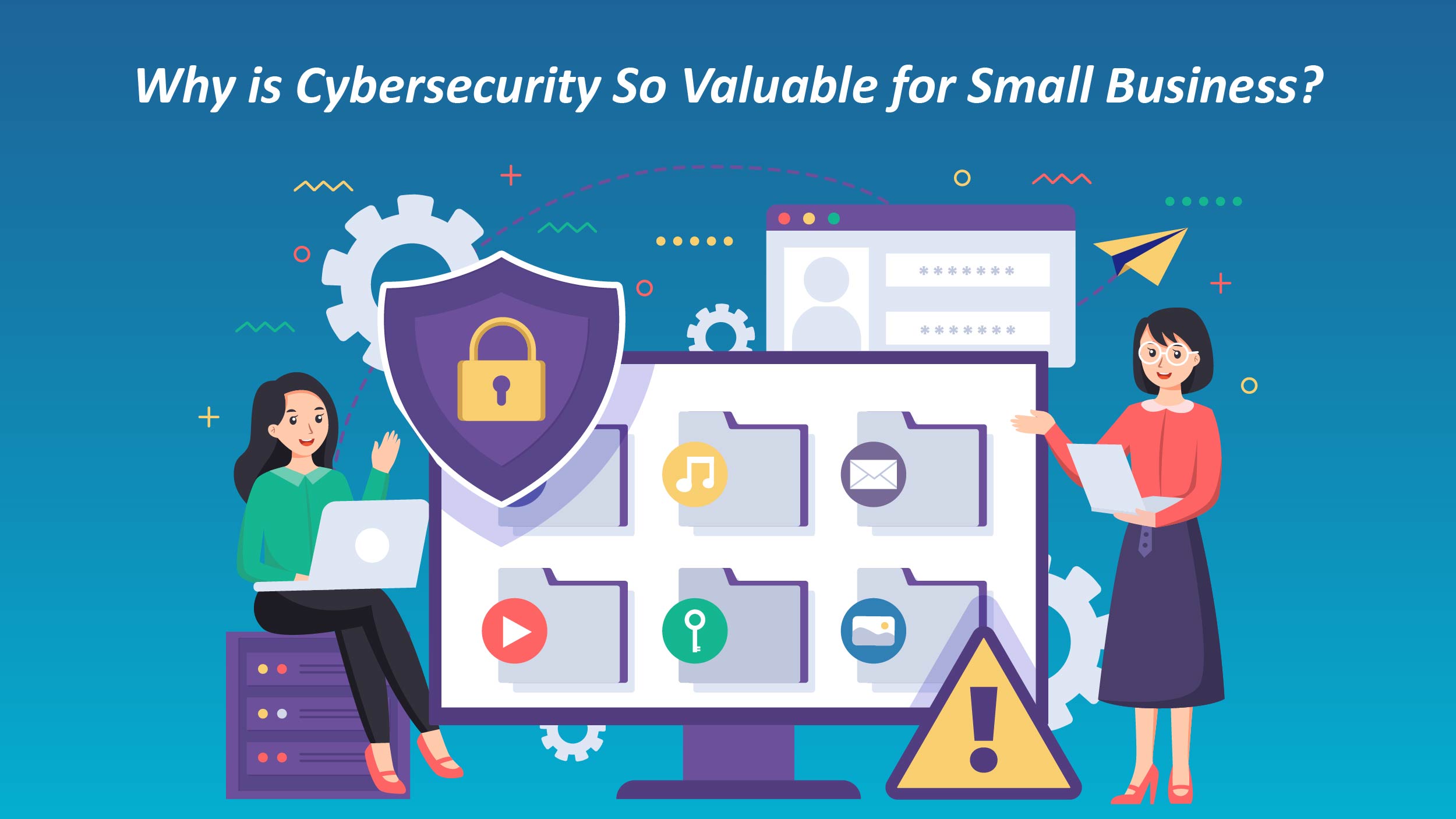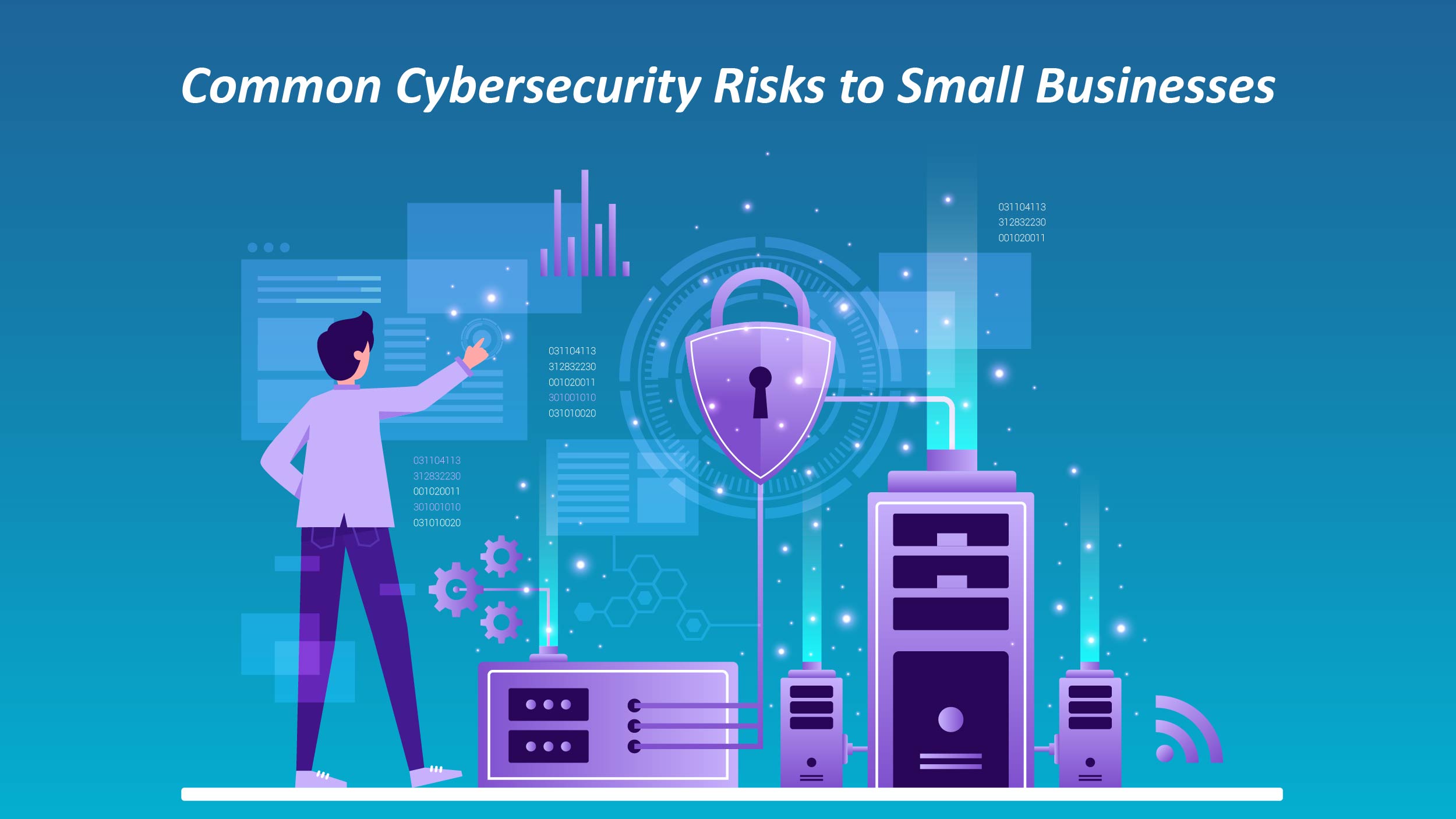Small businesses are not exempt from the risks posed by cyber threats; they can also become targets. In fact, there is evidence suggesting that small businesses are more susceptible to cyberattacks, primarily due to their limited resources that hinder their ability to defend against such threats effectively. Safeguarding your business against cyberattacks is crucial, but with the ever-changing cyber landscape, it can be overwhelming to determine the initial steps. This comprehensive guide is designed to assist small businesses in navigating the realm of cyber threats. Let’s dig in to learn more about cybersecurity for small businesses.
Why is Cybersecurity So Valuable for Small Business?

Cybersecurity threats pose a serious risk to your finances, data, and IT infrastructure. In the event of a successful breach, hackers can exploit vulnerabilities to gain access to critical information, including:
- Customer lists
- Credit card information of customers
- Banking details of your company
- Confidential pricing structures
- Proprietary product designs
- Business growth plans
- Confidential manufacturing processes
- Various forms of intellectual property
These cybersecurity breaches not only pose a threat to your company but also serve as a potential gateway for hackers to infiltrate the networks of other businesses that are interconnected through your supply chain. A cyberattack can cause immense harm to your company. In reality, nearly 60% of small businesses that experience an attack are forced to cease operations within half a year following the breach.
With the global rise in remote work, ensuring robust cybersecurity for small businesses is paramount. Small businesses, relying heavily on cloud-based tools for various operations like online meetings, advertising, transactions, and communications, must prioritize safeguarding their data and systems from unauthorized breaches for both financial and reputational security.
Also Read : A Comprehensive Guide to DevOps Best Practices in 2024: 8 Pillars of Success
Common Cybersecurity Risks to Small Businesses

1. Malware
Malware, also known as malicious software, refers to a cyberattack that carries out unauthorized actions on the target system. It encompasses various malicious tactics such as ransomware, viruses, phishing, and more. The three primary categories of malware include Trojan horses, viruses, and worms.
2. Viruses
Cybersecurity for small businesses is crucial as viruses can harm hardware, leading to program damage, file deletion, and slow computer performance. Viruses infiltrate systems through file sharing, infected emails, malicious websites, or harmful downloads. Indications of a virus include more pop-ups, unauthorized password changes, deleted files, and reduced network speed.
3. Ransomware
Ransomware, designed to extort vital company data, demands payment within a short timeframe. It often spreads through email spam or network attacks, primarily targeting small businesses. In a notable incident in July 2021, the REvil gang exploited Kaseya’s systems, impacting 800-1,500 small businesses. Despite Kaseya’s swift response, the attack led to financial and operational repercussions for affected businesses, prompting investigations and potential customer notifications.
4. Phishing
Small businesses are at risk from phishing attacks that aim to steal sensitive information. Cybersecurity for small businesses is vital to protect against deceptive emails and business email compromise (BEC) threats. Staying informed about cyber threats is crucial for effective defense.
5. Password Hacking
Avoid using common passwords like “123456” and “password”. Surprisingly, 59% of people use the same password for all their accounts. Protect yourself from password theft by making smart choices. Cybercriminals exploit easily guessable passwords and personal information. Hashing, a technique hackers use, can compromise passwords based on encryption strength. Secure your accounts with unique and strong passwords.
Cyber Security Tips for Small Businesses
Broadband and IT drive small business expansion and productivity. Yet, a cybersecurity strategy is crucial to safeguard businesses, customers, and data from rising threats. Listed below are some tips with regard to cybersecurity for small businesses.
1. Security Principles Training for Employees
Implement security measures for employees, including robust password requirements and clear Internet usage guidelines with penalties for violating cybersecurity policies. Define rules for handling and safeguarding customer information and other critical data.
2. Defend Against Cyber Attacks on Information, Computers, and Networks
Use the latest security software, browser, and operating system to defend against online threats. Schedule antivirus scans after updates and promptly install other essential software updates.
3. Safeguard Internet Connection with Firewall Security
A firewall, comprising programs, safeguards private network data from external access. Activate the operating system’s firewall or install free online firewall software. For remote work, ensure home systems have firewall protection.
4. Develop a Mobile Device Action Plan
Secure mobile devices with passwords, data encryption, and security apps to protect confidential information and prevent unauthorized access. Establish reporting procedures for lost or stolen devices.
5. Back Up Vital Business Data and Information
Ensure cybersecurity for small businesses by consistently backing up essential data like word processing documents, spreadsheets, databases, financial files, and HR records. Automate backups, preferably every week, and store copies securely off-site or in the cloud.
6. Manage Physical Access and User Accounts
Secure business computers by restricting access to authorized users. Safeguard laptops by locking them when not in use. Establish individual user accounts with strong passwords for each employee, reserving administrative privileges for trusted IT staff and key personnel.
7. Ensure Security of Wi-Fi Networks
Secure your workplace Wi-Fi network by encrypting it, hiding the network name (SSID), and implementing password protection on the router for controlled access.
8. Implement Best Practices for Payment Cards
Ensure the use of trusted tools and anti-fraud services by collaborating with banks or processors. Adhere to security obligations outlined in agreements. Isolate payment systems from less secure programs and avoid using the same computer for payments and internet browsing. This is crucial for cybersecurity for small businesses.
9. Restrict Employee Data Access and Software Installation Authority
To ensure data security, it is important to restrict employees’ access to specific data systems based on their job responsibilities. Granting access only to the necessary systems and prohibiting the installation of unauthorized software are effective measures that should be implemented.
10. Enhance Passwords and Authentication Practices
Mandate unique passwords, changed every three months for employees. Explore multi-factor authentication, adding extra layers of security. Verify with vendors, particularly financial institutions, for available multi-factor authentication options.
Summing it Up
The importance of cybersecurity for small businesses cannot be overstated in today’s digital landscape. As technology continues to advance, so do the threats that can compromise sensitive data and jeopardize the very existence of these enterprises. Small businesses may think they are not a significant target, but they are often more vulnerable due to limited resources and a lack of robust security measures. safeguarding your small business against cyber threats is not just a matter of technological investment; it’s a strategic imperative for survival in today’s digital landscape.






